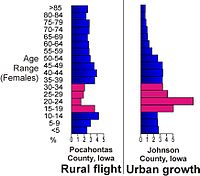
Photo from wikipedia
Concerns about food safety together with rising disposable income means consumers in developing countries are willing to pay more for safe and high-quality food such as organic vegetables. At the… Click to show full abstract
Concerns about food safety together with rising disposable income means consumers in developing countries are willing to pay more for safe and high-quality food such as organic vegetables. At the same time, socioeconomic profiles differ in rural versus urban areas leading to differing intakes. This paper investigates regional differences in the determinants of willingness to pay (WTP) for organic vegetables in Vietnam. A contingent valuation survey was used to collect information on consumer preferences of organic vegetables in two regions of Hanoi. Using interval regression model, we found that consumer perception about organic vegetables, trust in labels, and disposable family income increased WTP for organic vegetables in both urban and rural regions. Risk perception of conventional vegetables was high in both regions. However, higher WTP prevailed only in the rural region. Besides, growing vegetables at home affected the WTP only in the rural region while education played a role in the WTP in the urban region. Since rural and urban consumers have different preferences toward organic food, they should not be treated as a homogenous group in formulating organic food policy. This paper also shows that very high price of organic vegetables and lack of trust in organic labels are key barriers to organic purchase. Thus, creating more trust and reducing the price of organic vegetables through lowering certification cost might be a good strategy to expand the organic vegetable market in Vietnam.
Journal Title: Appetite
Year Published: 2019
Link to full text (if available)
Share on Social Media: Sign Up to like & get
recommendations!